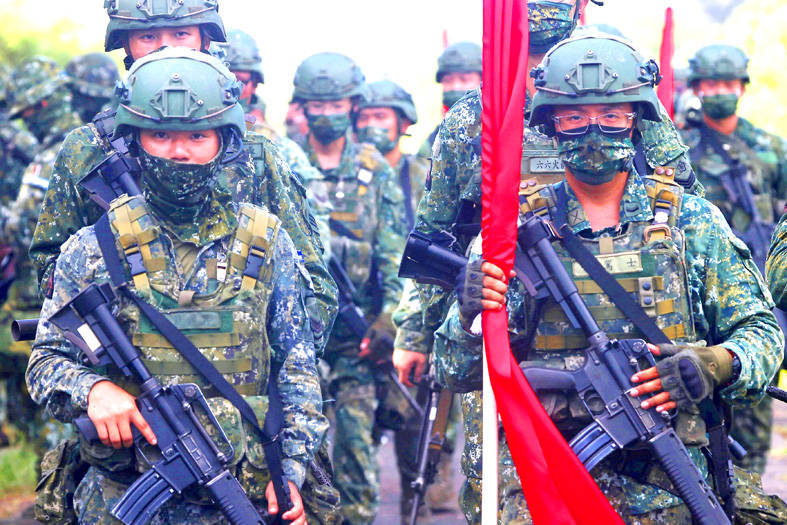《TAIPEI TIMES》 China boosts military budget by 7.1%

Soldiers march to position during an anti-invasion drill on a beach during the annual Han Kuang military exercises in Tainan on Sept. 14 last year. Photo: Ann Wang, Reuters
‘WE ARE CERTAIN’: Taiwan is much easier to defend than invade and the nation can destroy nearly all of the landing troops in the event of an attack, an arms expert said
By Wu Su-wei, Jason Pan and Jonathan Chin / Staff reporters, with staff writer
China’s military budget for this year is to be 1.45 trillion yuan (US$229.5 billion), or 17 times Taiwan’s defense spending for the year.
The Chinese Ministry of Finance said in a statement on Saturday that the defense budget would increase 7.1 percent from last year.
The figure indicates a faster expansion than before and widens the defense spending gap between Taiwan and China.
Speaking to the Chinese National People’s Congress in Beijing, Chinese Premier Li Keqiang (李克強) said China is to implement “Chinese President Xi Jinping (習近平) thought as it pertains to the strengthening of the military and realize the centennial goals for the founding of the armed forces.”
“Military capabilities must be enhanced in every aspect and risks in every sector and region be managed comprehensively so that the strategic capability to defend national sovereignty, security and interests is improved,” he said.
The state-run Global Times cited an anonymous expert as saying that China’s military budget is not a challenge to the US position in the Indo-Pacific region and that the figure does not represent a great increase after taking inflation into account.
The President Tsai Ing-wen (蔡英文) administration’s military budget for this fiscal year, which lawmakers approved after a slight reduction, is NT$374 billion (US$13.3 billion), although some of that is due to a 4 percent increase to the salaries of civil servants.
Lawmakers also authorized special budgets to acquire new fighter jets, and improve sea and air capabilities in the form of two special budgets of NT$400 billion and NT$480 billion respectively, which are separate from the general defense budget.
Asked about China’s military budget, Chen Shih-min (陳世民), associate professor of political science at National Taiwan University, said the defense spending of a country reflects its grand strategy.
As a smaller country in terms of territory and population, Taiwan could not match China’s military spending, which explains its emphasis on an asymmetric warfare strategy, he said.
However, the Ministry of National Defense should consider shifting the nation’s strategy toward preventing war via deterrence instead of focusing on winning a war after hostilities break out, he said.
“This means dedicating limited military budget to retaliatory capabilities that could inflict intolerable damage on an adversary,” he said.
TAIWAN CAN REPEL CHINA
Separately, military experts assessing the situation in Ukraine on Saturday said that Taiwan could repel an invasion by China and defeat the Chinese People’s Liberation Army (PLA), as the nation already has portable missile systems in place.
Taiwan is to acquire 400 US-made FGM-148 Javelin portable shoulder-fired anti-tank missiles with automatic infrared guidance. The nation is scheduled to take delivery of 200 missiles next year and the remaining 200 units the following year, a ministry official said on condition of anonymity.
The missiles have an effective range of 2,500m.
Javelin missiles are being used by Ukrainian forces against Russian armor.
The purchase would enable Taiwan’s military to upgrade its weapons and gradually phase out older Javelin models in its stock, the official added.
Chang Cheng (張誠), former chief engineer of the Hsiung Feng III missile project, said that “Taiwan is much easier to defend than invade, and the conditions are very different from Ukraine.”
“It has been assessed that China could launch four amphibious marine landing divisions and two army infantry divisions for a total of about 30,000 troops, at least for the first stage of invasion,” Chang said.
“However, with Taiwan’s domestically developed long-range missiles, together with portable air-defense missile systems, we are certain that we can destroy almost all PLA landing troops.”
Additional reporting by Lo Tien-pin
新聞來源:TAIPEI TIMES













